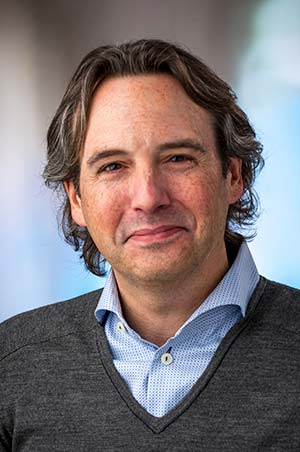McGarry Houghton, MD
Professor
Translational Science and Therapeutics Division, Fred Hutch
Professor
Human Biology Division, Fred Hutch
Satya and Rao Remala Family Endowed Chair
Fred Hutch
Pulmonologist Dr. McGarry Houghton studies lung diseases, especially lung cancer, and he develops new methods to detect and treat them. He leads the Hutch’s lung cancer research group. His major focus is on identifying the molecules and cells in non-small cell lung cancer that prevent the immune system from attacking the tumor. In particular, he is an expert in neutrophils, a kind of immune cell that tumors co-opt for their own ends. He uses his knowledge about tumor immunology to develop targeted immunotherapies that unleash the body’s anti-cancer power. Dr. Houghton also identifies blood biomarkers for lung cancers. Such biomarkers could eventually serve as the foundation for a blood test to detect these cancers early, when they are most treatable. Finally, Dr. Houghton investigates how lung diseases such as emphysema and pulmonary fibrosis increase the risk for lung cancer, with the aim of finding ways to stop this disease progression.
Other Appointments & Affiliations
Associate Professor, Division of Pulmonary and Critical Care Medicine, University of WashingtonAssociate Professor, Division of Pulmonary and Critical Care Medicine
University of Washington
Education
Fellow, Pulmonary & Critical Care Medicine, Washington University School of Medicine, 2004
Resident, Internal Medicine, UT-Southwestern (Parkland Hospital), 1999
Intern, Internal Medicine, UT-Southwestern (Parkland Hospital), 1997
Georgetown University, School of Medicine, 1996, MD
Johns Hopkins University, 1992, BA (Chemistry)
Research Interests
The Houghton Lab studies the immune cell composition and function in solid tumor malignancies, most prominently in non-small cell lung cancer (NSCLC). The group has established a platform to combine the study of human tissue specimens and mouse models of cancer to address key questions ranging from mechanisms of immune escape and treatment failures to the identification of novel biomarkers for lung cancer early detection. This platform has revealed an essential role for myeloid lineage cells—particularly neutrophils—in excluding tumor-reactive lymphocytes from the malignant portion of tumors. The current focus of the lab is to determine the mechanistic basis of lymphocyte-excluded NSCLCs and to develop therapeutic strategies to circumvent their exclusion.
Current Projects
Immune cell composition and function within the tumor microenvironment
Contribution of neutrophil lineage cells to NSCLC growth and invasiveness
Lung cancer early detection
"In all the time I've given to [neutrophils and lung cancer], I haven't quite been able to put all the pieces together. But it’s accomplishable."
— Dr. McGarry Houghton
